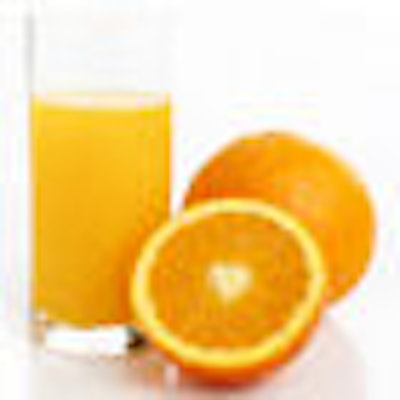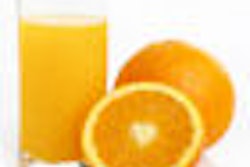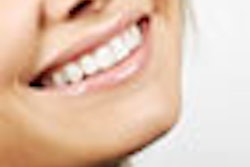
When it comes to snacking, a common belief is that whole fruits are less harmful to tooth enamel than fruit juice. But what does the evidence say?
Noting that the effects of sugars present in a free (extrinsic) or other (intrinsic) form on enamel demineralization have never been studied, researchers from Leeds Dental Institute and the University of Liverpool compared the enamel demineralization effects in situ of both whole and juiced fruits and vegetables (Caries Research, August 26, 2011).
"There is very little experimental evidence that sugars consumed in an intrinsic form are less cariogenic compared with those consumed in an extrinsic form," they wrote.
Their small study, which was supported by a project grant from the U.K. Sugar Bureau and the Biscuit, Cake, Chocolate, and Confectionery group, involved 10 individuals (four female, six male; average age, 37 years) who consumed test foods and corresponding juices from the same supplier and same batch.
Each fruit and vegetable was analyzed for its sugar content. The test foods included apples (14% total sugars), oranges (6%), grapes (15%), carrots (6%), and tomatoes (3%). All three types of sugars -- glucose, fructose, and sucrose -- were represented.
Using a juicing machine, juices were extracted from the same batch as the whole produce. Raisins, containing 64% sugars, were included in the study as well. For control, 10% sucrose and 10% sorbitol solutions were used. Over a 10-day period, 35 g of each product, whole or juiced, was consumed seven times each day.
Removable Hawley appliance
White spot lesions were created on extracted human premolars by immersing them in an acidified gel system for seven days. Next, the lesion was divided into three sections, one for control and the other two as test subjects. All were sterilized with gamma irradiation.
To expose the test lesions to fruit, vegetables, and juice in each volunteer, the researchers created a mandibular removable Hawley appliance for the subjects to wear. The enamel slab was affixed with sticky wax to the left buccal flange on each appliance. Because the lesion would only develop in the presence of plaque, the sample was covered by 0.15-mm Dacron gauze.
Study participants wore the appliance for two days to ensure plaque buildup on the sample before they ingested the whole fruits and vegetables, juice, or control. The subjects were instructed to spread out the consumption of their test food throughout the day while taking two minutes to consume each portion. The appliances were only removed when the volunteers were eating or drinking items that were outside of the study. For brushing, a fluoride-free dentifrice was used twice a day.
The researchers employed a crossover design, so the trial required 13 10-day periods; a one-week washout period took place between each 10-day sample testing phase. At the completion of the testing phase, the samples were radiographed and analyzed for mineral loss, and comparisons between different samples were made relative to the control.
'Significant demineralization'
All test foods and drinks resulted in significant demineralization (p < 0.01), as did the positive control sucrose (p < 0.001), the researchers found. There was no statistically significant demineralization with sorbitol. All the test products produced more demineralization compared with the sorbitol control (p < 0.05) but were not significantly different from sucrose. In addition, there were no significant differences between the test products when consumed either whole or in juiced form.
"The consumption of sugars in an intrinsic form may not be any less harmful to tooth enamel than consumption in an extrinsic form," the study authors wrote.
While the lack of fluoride protection from toothpaste played some part in the high demineralization, the researchers were still surprised by some of the results, they noted.
"Even test products like tomatoes and carrots, which contained considerably lower amounts of sugar, showed a significant increase in mineral loss, which was comparable to that observed with foods containing higher levels of sugar such as grapes," they wrote
Conversely, raisins, with their high sugar content, had the anticipated impact on enamel. These sugars "intrinsically located," caused significant further demineralization, the researchers noted. Children sporadically snacking on raisins over a long period of time could face a heightened risk of caries, they warned.
Ultimately, there were no significant differences between juices and whole fruits, which could prove useful when giving oral health advice to patients, the researchers added.
"This experimental evidence suggests that consumption of sugars in an intrinsic form may not be safer than consumption in an extrinsic or free form," the study authors wrote. "Eating fruits and vegetables frequently as 'whole' foodstuffs may cause similar enamel demineralization as when they are consumed as a juice in subjects not using fluoride toothpaste."
It would be interesting to study the demineralizing potential of fruits and vegetables, consumed whole or juiced, while the subjects use fluoride toothpaste, they added.



















